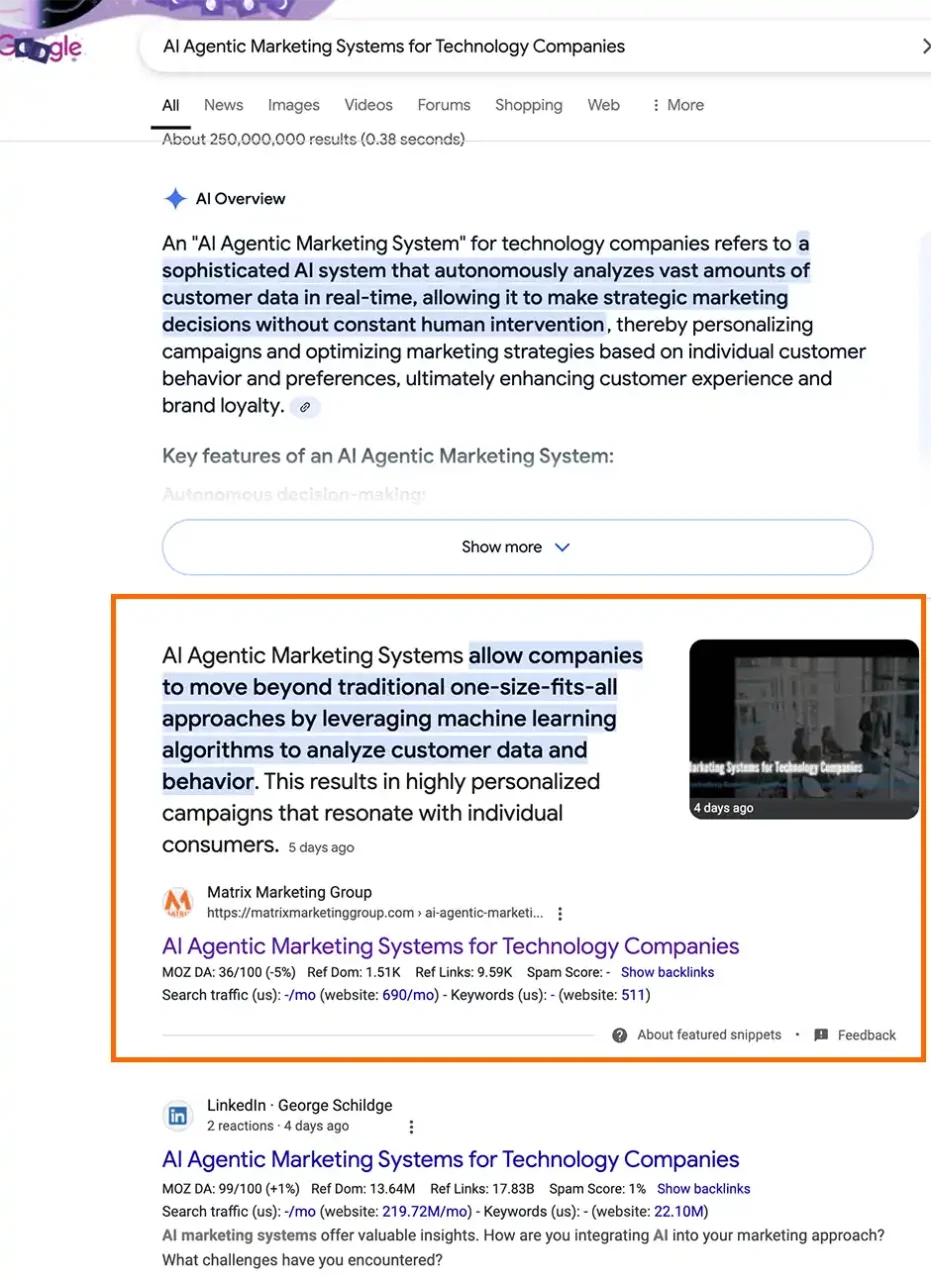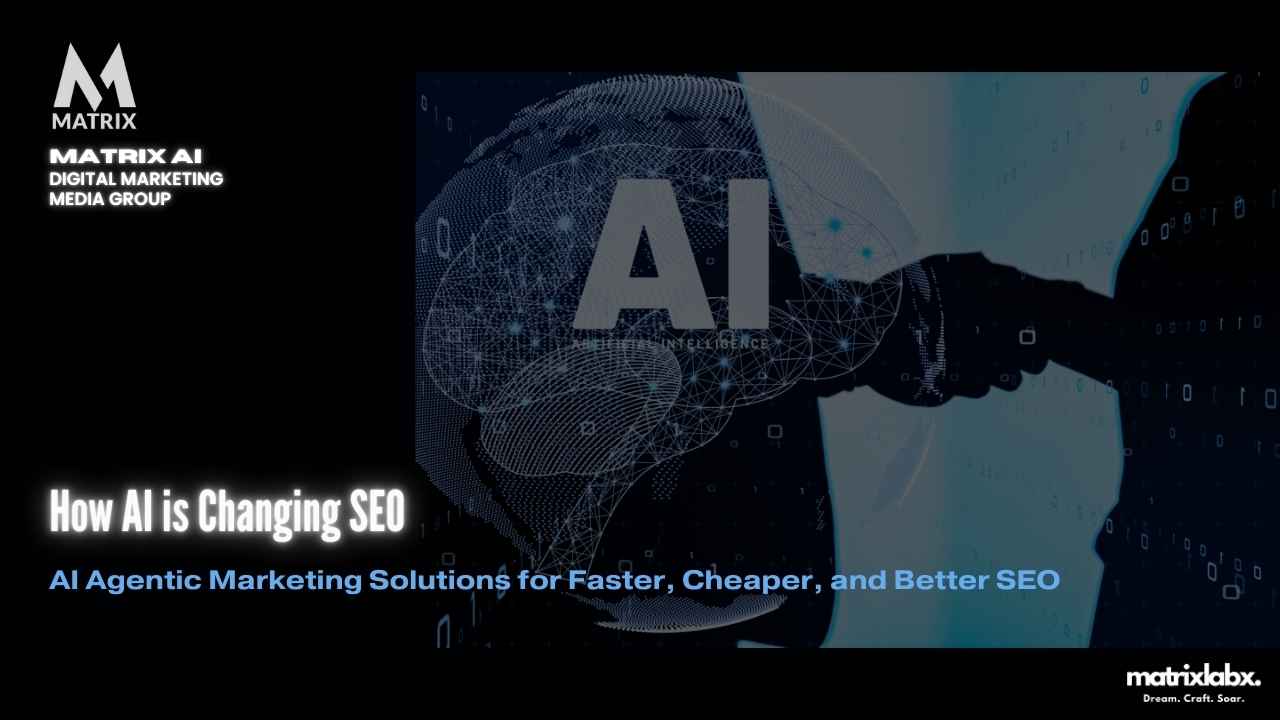How AI is Changing SEO
How AI is Revolutionizing SEO: What Marketing Managers Need to Know
In a rapidly evolving digital landscape, 61% of marketers say improving SEO and growing their organic presence is their top inbound marketing priority.
Yet, as artificial intelligence (AI) continues to reshape the industry, many marketing managers wonder how AI will impact SEO strategies and how to stay ahead.
This article delves into AI’s transformative role in SEO, addressing common concerns and offering evidence-based recommendations to help you confidently navigate this new frontier.
Understanding AI’s Impact on SEO
AI technology is revolutionizing how search engines interpret and rank content. AI-powered algorithms can now accurately understand context, semantics, and user intent.
Traditional keyword-stuffing tactics are becoming obsolete, and marketing managers must focus on creating high-quality, relevant content that meets user needs.
A study by BrightEdge found that 51% of all website traffic comes from organic search, emphasizing the importance of adapting to AI-driven SEO changes to maintain visibility and competitiveness.
Over 70% of Voice Search Results Will Be Powered by AI-Generated Summaries
With natural language processing (NLP) advancements, voice search engines are increasingly using AI to generate concise, contextually accurate answers. This means traditional keyword optimization will give way to “answer optimization.”
Addressing Concerns and Embracing Change
One major concern among marketing managers is the fear of losing control over SEO strategies due to AI’s increasing role.
However, viewing AI as an ally rather than an adversary is important. By leveraging AI tools, you can gain deeper insights into user behavior, optimize content for voice search, and enhance the overall user experience on your site.
Evidence shows that companies utilizing AI-driven SEO strategies see up to a 30% increase in traffic and conversion rates. Embracing AI allows you to stay ahead of the curve, ensuring your brand remains relevant in an ever-changing digital ecosystem.
Practical Recommendations for Marketing Managers
To harness the power of AI in your SEO strategy, start by integrating AI-based analytics tools that provide real-time insights into search trends and user preferences.
Prioritize content that answers user queries directly and focuses on long-tail keywords that align with conversational search patterns.
Additionally, optimize your site for mobile and voice search, as these are becoming increasingly important in the AI-driven search landscape.
By staying informed and proactive, you can transform AI’s impact on SEO from a potential challenge into a significant opportunity for growth.
How AI is Transforming SEO: A New Era in Digital Marketing
Revolutionizing Search Engine Optimization
Artificial Intelligence (AI) is dramatically reshaping the landscape of Search Engine Optimization (SEO), offering marketers innovative ways to enhance visibility and connect with target audiences. By streamlining data analysis and automating routine tasks, AI empowers marketers to focus on crafting strategies that genuinely resonate with users.
The “why” of AI in SEO lies in its ability to quickly process vast amounts of data, predicting trends and consumer behavior with remarkable accuracy. This gives savvy marketers a decisive edge in crafting content that aligns with search engine algorithms and user intent.
The Impact in Various Contexts
The transformative power of AI can be observed across several fronts. For instance, AI-powered tools facilitate precise keyword research and competitive analysis, allowing marketing professionals to identify previously overlooked opportunities.
Moreover, AI-driven applications are adept at personalizing user experiences, leading to increased engagement and conversion rates.
70% of agencies need help integrating AI solutions.
70% of agencies need help integrating AI solutions into their tech stack, citing a lack of interoperability as a major barrier. 85% of marketing agencies need more in-house expertise to manage and deploy multi-AI agent systems effectively.
The “where” extends beyond conventional digital platforms, influencing SEO strategies on social media, voice search optimization, and personalized content delivery systems, pushing the boundaries of traditional methodologies.
As a marketing manager, delving into these advancements will spark innovation and position your campaigns at the forefront of the digital frontier.
AI is not just an enhancement to SEO practices; it’s a foundational shift towards smarter, more tailored, and efficient marketing strategies. Embrace this exciting trend to outpace competitors and captivate audiences in the ever-evolving digital landscape.
Struggling with Poor Marketing ROI?
As a marketing manager, nothing is more frustrating than investing time and resources in campaigns that don’t deliver an adequate return on investment.
Poor marketing ROI isn’t just a drain on your budget—it’s a missed opportunity to propel your business forward. Imagine all those sleepless nights and meticulous planning going down the drain with lackluster results.
It’s not just disappointing; it damages your brand and bottom line. You’re left explaining to stakeholders why the efforts didn’t pay off, risking credibility each time another campaign underperforms.

The Aggravating Reality of Inefficient Marketing
In today’s hyper-competitive market, simply “winging it” with traditional methods isn’t enough.
The market landscape constantly evolves, and consumers are becoming harder to engage with every passing day. Ineffective strategies not only waste resources but also let competitors surge ahead.
When your campaigns don’t resonate, it’s a clear sign that something needs to change—fast. Staying stuck in the status quo harms your brand’s growth and allows competitors to seize your market share.
This scenario paves the way for declining trust from customers and internal stakeholders.
Revolutionize Your Marketing with AI Solutions
Here’s the game-changer: our AI marketing solutions. By leveraging advanced analytics and machine learning, our platform provides unparalleled insights into customer behavior, enabling you to craft campaigns that truly resonate.
This isn’t just about having data; it’s about having actionable insights that ensure your marketing dollars are spent wisely. Imagine consistently achieving higher engagement rates, lower acquisition costs, and improved conversion rates.
By entrusting your marketing strategy to an AI-driven tool, you don’t just solve the problem—you transform it into an opportunity for growth and success. Embrace the future and watch your ROI not only meet but exceed expectations.
Don’t settle for mediocrity. Let’s transform your marketing strategy into a powerful, results-driven machine. Curious to see what our AI solutions can do for you? Take the first step towards revolutionary change today.
Revolutionizing SEO: The AI Transformation
A New Era for Marketers
“As an SEO strategist, the integration of AI has been nothing short of transformative,” says Sarah Lin, a marketing industry veteran and head of digital strategy at TechWave Solutions. AI tools have enabled us to predict trends and tailor our strategies in real-time accurately.”
Lin emphasizes how predictive analytics, powered by AI, help dissect user behavior across platforms to a granular level, leading to more personalized content creation.
Precision and Innovation
Dr. Martin Kowalski, a data scientist specializing in marketing algorithms, explains, “AI’s ability to process and analyze massive amounts of data changes the game entirely. It empowers marketers to hone in on the most effective channels and messaging with precision we have never seen before.”
Kowalski highlights AI-driven sentiment analysis as a pivotal shift that helps marketers quickly assess public opinion and adapt their approaches almost instantaneously in response to emerging trends.
The Human Touch Meets Technology
Rachel Dean, Marketing Director at Creative Edge, states, “While AI’s analytical prowess is unparalleled, the human element is still crucial. AI augments our capabilities but does not replace the creative intuition needed in marketing.”
Dean underscores the importance of this synergy, where AI handles the heavy lifting in data processing, allowing human creativity to flourish resulting in truly innovative and engaging campaigns.
These expert insights capture how AI is not just a tool but a catalyst, pushing the boundaries of what is possible in SEO and marketing.
The combined energy of human creativity and AI’s analytical power promises a future rich with possibilities, urging marketers to stay curious and adaptive in this evolving landscape.
85% of Web Pages Ranking in the Top 3 Will Feature Long-Form, AI-Augmented Content
Search engines will favor content that combines in-depth analysis with conversational tones, much of which will be AI-enhanced. AI-assisted research and writing tools will enable the creation of comprehensive, authoritative content at scale.
How AI is Transforming SEO
Integrating Artificial Intelligence (AI) into search engine optimization (SEO) marks a revolutionary shift in digital marketing strategies.
With Google’s algorithm embracing AI technologies like RankBrain and BERT, SEO is no longer just about keywords and backlinks.
It’s about user intent, behavior analysis, and content personalization.
What is RankBrain?
RankBrain is an artificial intelligence (AI) system developed by Google to help process search queries and improve the quality of search results.
It was first introduced in 2015 and has since become one of the most important factors in determining the ranking of web pages in Google search results.
How does RankBrain work?
RankBrain uses a variety of factors to assess the relevance and quality of web pages, including:
- The content of the page
- The structure of the page
- The freshness of the page
- The authority of the page
- The user engagement with the page
RankBrain then uses this information to assign each page a score, which determines its ranking in search results.
Why is RankBrain important?
RankBrain is important because it helps Google provide users with more relevant and useful search results.
It is also important for businesses because it can help their websites rank higher in search results, leading to more traffic and conversions.
How can I optimize my website for RankBrain?
There are several things you can do to optimize your website for RankBrain, including:
- Create high-quality, relevant content
- Use a clear and concise structure for your pages
- Update your content regularly
- Build backlinks from high-quality websites
- Encourage users to engage with your content
These tips can help your website rank higher in search results and reach more potential customers.
Beyond Keywords: AI’s Role in Understanding Intent

One relatively unknown brand that has mastered this is SearchWave Technologies. By leveraging AI algorithms, they focus on semantic search and understanding user intent.
This allows them to create content that closely aligns with users’ meanings, not just their typing. Focusing on user intent rather than mere keywords enhances their clients’ discoverability online.
Optimizing Content with AI-Driven Insights
Another lesser-known brand, Syntactic Insights, utilizes AI to analyze user engagement metrics such as bounce rates and page time.
They use AI-driven analytics tools to refine content strategy, ensuring content is relevant and engaging.
By understanding user behavior through AI, Syntactic Insights tailors its recommendations to maximize engagement and retention.
Automating the Tedious: AI in Task Management
Finally, RankForward Solutions stands out by integrating AI to automate SEO tasks like data analysis and keyword management. Automating these repetitive tasks allows marketers to focus on strategic planning and creative initiatives.
RankForward’s use of machine learning algorithms means their automated systems adapt and remain effective as search engine algorithms evolve.
In conclusion, brands like SearchWave Technologies, Syntactic Insights, and RankForward Solutions exemplify how integrating AI into SEO strategies can improve user understanding, create better content, and manage tasks efficiently.
As AI advances, its role in SEO will undoubtedly expand, offering businesses opportunities to rise above conventional methods and reach new heights in their digital presence.
Unraveling the Matrix: How AI is Revolutionizing SEO

The digital landscape is perpetually evolving, and artificial intelligence (AI) is undergoing one of the most significant paradigm shifts.
Understanding AI’s application in search engine optimization (SEO) is akin to peering into a complex, dynamic matrix that changes how we approach online visibility and engagement.
AI’s predictive analytics, natural language processing, and machine learning capabilities are reshaping search engine algorithms and user interaction models. So, where do you begin in this multifaceted transformation?
Understanding the Core: AI Algorithms in SEO
To truly grasp AI’s impact on SEO, one must first delve into the algorithms at work. Search engines like Google use AI algorithms like RankBrain to better interpret user queries and offer more relevant search results.
These AI-driven algorithms analyze countless signals, including user behavior and content relevance, ultimately influencing ranking positions.
Learning how these algorithms operate and what factors they prioritize has become crucial for SEO specialists aiming to optimize their strategies.
Implementing AI Tools: A Practical Approach
Embracing AI in your SEO strategy requires the right set of tools. Platforms such as OrchestraAI, Clearscope, and SEMrush’s AI Writing Assistant are designed to enhance keyword research, content strategy, and competitive analysis through machine learning insights.
These tools make SEO more efficient by identifying content gaps, suggesting keyword opportunities, and predicting content performance.
Starting with basic tools and gradually exploring advanced features will set a robust foundation for integrating AI into your SEO efforts.
Fostering Continuous Learning: Keeping Up with AI Trends
As AI technology evolves, staying abreast of the latest updates in AI and SEO is vital. To keep your knowledge current, engage in online communities, attend webinars, and read industry blogs.
Continuously testing and refining your SEO approach in line with AI advancements will spark curiosity and position you ahead of the competition in this transformative journey.
The matrix of AI and SEO is vast and intricate, yet it offers boundless opportunities for those who dare to explore its depths.
Conclusion: How AI is Changing SEO
The Transformative Power of AI
Artificial intelligence (AI) is revolutionizing search engine optimization (SEO) by introducing innovative strategies and tools in the ever-evolving digital landscape.
AI can analyze vast amounts of data with remarkable accuracy and traditional SEO methods. By leveraging AI, businesses can enhance their online visibility more effectively, tailored to the dynamic nature of users’ search behaviors.
Personalization and User Experience Enhancement
Personalization has become the cornerstone of modern SEO strategies, with AI at its helm. Machine learning algorithms deliver personalized search results by interpreting users’ search intent and preferences.
This ensures that web content aligns closely with users’ expectations, fostering a seamless user experience. Moreover, AI-driven tools like chatbots and voice assistants optimize content delivery, making it more interactive and user-centric.
Predictive Analytics and SEO Efficiency
AI’s predictive analytics capabilities are critical in foreseeing SEO trends and streamlining efforts. By analyzing historical data, AI predicts future search trends and user behavior, allowing businesses to strategize more proactively.
This predictive power aids in keyword optimization, content creation, and link-building strategies, ensuring resources are channeled toward the most effective SEO activities.
AI’s influence on SEO is profound, offering a glimpse into a future where search experiences are increasingly intuitive and user-focused.
As businesses adapt to these advancements, they unlock growth opportunities and push the boundaries of what is possible in digital marketing.
AI enhances SEO efficiency and enriches the user’s journey, creating a more interconnected and responsive digital ecosystem.


